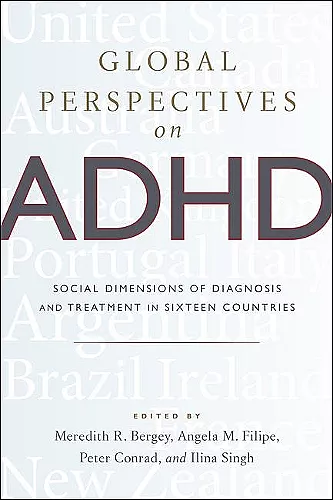Global Perspectives on ADHD
Social Dimensions of Diagnosis and Treatment in Sixteen Countries
Peter Conrad editor Meredith R Bergey editor Angela M Filipe editor Ilina Singh editor
Format:Paperback
Publisher:Johns Hopkins University Press
Published:23rd Jan '18
Currently unavailable, and unfortunately no date known when it will be back

Global Perspectives on ADHD provides a unique and pathbreaking contribution for understanding this condition in a comparative perspective. Its sweeping range incorporates the definitions, treatments, and controversies of ADHD in North and South America, Europe, Asia, and Africa. It will be an indispensable resource for scholars and clinicians in the field for many years to come. -- Allan V. Horwitz, author of Anxiety: A Short History An intriguing, necessary, and nuanced global perspective on a disorder that is not simply made in America. -- Katherine Ellison, Pulitzer Prize-winning journalist, author of Buzz: A Year of Paying Attention
Attention deficit-hyperactivity disorder (ADHD) has been a common psychiatric diagnosis in both children and adults since the 1980s and 1990s in the United States. But the diagnosis was much less common-even unknown-in other parts of the world. By the end of the twentieth century, this was no longer the case, and ADHD diagnosis and treatment became an increasingly widespread global phenomenon. As the diagnosis was adopted around the world, the definition and treatment of ADHD often changed in the context of different psychiatric professions, medical systems, and cultures. Global Perspectives on ADHD is the first book to examine how this expanding public health concern is diagnosed and treated in 16 different countries. In some countries, readers learn, over 10% of school-aged children and adolescents are diagnosed with ADHD; in others, that figure is less than 1%. Some countries focus on medicating children with ADHD; others emphasize parent intervention or child therapy. Showing how a medical diagnosis varies across contexts and time periods, this book explains how those distinctions shape medical interventions and guidelines, filling a much-needed gap by examining ADHD on an international scale. Contributors: Madeleine Akrich, Mari J. Armstrong-Hough, Meredith R. Bergey, Eugenia Bianchi, Christian Broer, Peter Conrad, Claire Edwards, Silvia A. Faraone, Angela M. Filipe, Alessandra Frigerio, Valeria Portugal Goncalves, Linda J. Graham, Hiroyuki Ito, Fabian Karsch, Victor Kraak, Claudia Malacrida, Lorenzo Montali, Yasuo Murayama, Sebastian Rojas Navarro, Orla O'Donovan, Francisco Ortega, Monica Pena Ochoa, Brenton J. Prosser, Vololona Rabeharisoa, Patricio Rojas, Tiffani Semach, Ilina Singh, Rachel Spronk, Junko Teruyama, Masatsugu Tsujii, Fan-Tzu Tseng, Manuel Vallee, Rafaela Zorzanelli
ISBN: 9781421423791
Dimensions: 229mm x 152mm x 25mm
Weight: 567g
416 pages